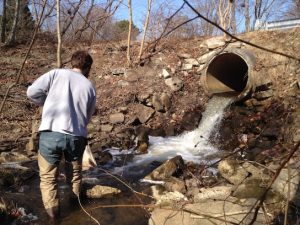Upgrading Culverts for Safer Roads and Healthier Ecosystems
 Institution: University of Maine
Institution: University of Maine
Sponsor: Maine Water Resources Research Institute
Identifying synergies between researchers and stakeholders for improved transportation infrastructure and ecological robustness (the ability to maintain normal functions after a disturbance) through coordinated road culvert improvement
Maine’s communities and economy are critically dependent on the safety of its road network, which is in turn dependent on tens of thousands of culverts that allow water to flow under roads. Unfortunately, many of these culverts are at risk of failure, either due to their degrading condition or because they are undersized for the increasingly large floods and bank erosion caused by climate change and urban development. Underperforming culverts also prevent many sea-run fish from reaching their spawning habitats, which adversely affects freshwater and marine ecosystems as well as the communities and economies that depend on them.
Underperforming culverts must be replaced under current state and federal standards that emphasize infrastructure longevity and ecological function, but replacement is costly. Maine Dept. of Transportation (DOT) is responsible for maintaining the safety and reliability of the state’s highways using their limited budget to prioritize replacement of critically degraded culverts on heavily used roads. Maine Dept. of Environmental Protection (DEP) also provides funding opportunities for municipal roadway infrastructure improvements and habitat restoration through a bond that includes $5 million to upgrade culverts. In parallel, The Nature Conservancy (TNC) is focused on culvert replacement on municipal and private roads, with the objective of improving the health of freshwater ecosystems. Additionally, the Maine Municipal Association (MMA) is concerned with reducing the vulnerability of local roads to increased flooding from climate change. Combined, these partners represent a wide range of stakeholders and needs in Maine.
Because these threats to the safety of transportation infrastructure and the health of aquatic ecosystems require a common focus on culverts, we are working with many partners to develop decision-making tools for culvert replacement that produce the greatest benefits to infrastructure and ecosystems at the least cost. By examining connections among road safety, ecosystem health, and climate resilience, this project is demonstrating how innovative collaborations among government agencies, non-governmental organizations and our interdisciplinary research teams can enhance data-driven decision-making.
Team Leader:
- Sam Roy, Postdoctoral Fellow, Mitchell Center for Sustainability Solutions, UMaine
Team Members:
- Adam Daigneault, Assistant Professor, Natural Resource Economics & Mitchell Center, UMaine
- Shaleen Jain, Associate Professor, Civil & Environmental Engineering & Mitchell Center, UMaine
Partners:
